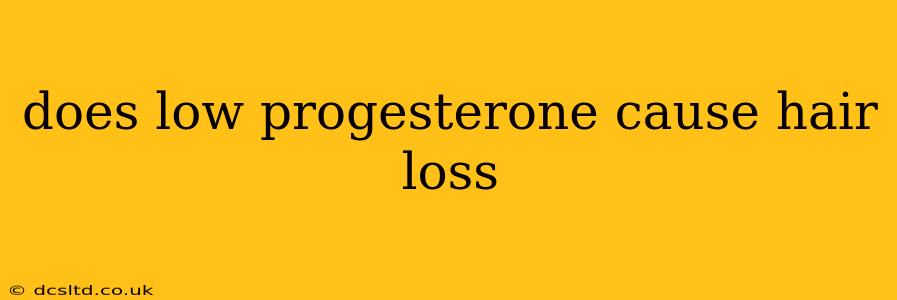Hair loss can be a distressing experience, impacting self-esteem and confidence. While numerous factors contribute to hair thinning and shedding, hormonal imbalances often play a significant role. One hormone frequently implicated is progesterone, a crucial female sex hormone involved in regulating the menstrual cycle, pregnancy, and overall reproductive health. This article delves into the complex relationship between low progesterone and hair loss, exploring the potential connection and addressing common questions.
What is Progesterone and its Role in Hair Health?
Progesterone is a steroid hormone primarily produced in the ovaries. Its functions extend far beyond reproduction, influencing various bodily systems, including hair growth. Progesterone works in conjunction with other hormones, such as estrogen and testosterone, to maintain a balanced hormonal environment essential for healthy hair follicles. While estrogen is often associated with hair growth, progesterone plays a vital supporting role, helping to regulate the hair growth cycle and prevent premature shedding.
Can Low Progesterone Levels Cause Hair Loss?
The connection between low progesterone and hair loss isn't straightforward. While low progesterone can disrupt hormonal balance, leading to various symptoms, it doesn't directly cause hair loss in the same way as, say, androgenetic alopecia (male or female pattern baldness). However, the imbalance it creates can indirectly contribute to hair shedding. This is because a hormonal imbalance often impacts other hormones involved in hair growth, like androgens (including testosterone), which can cause hair loss. Therefore, low progesterone might be a contributing factor in hair loss as part of a larger hormonal imbalance, rather than the sole cause.
How Does Hormonal Imbalance Affect Hair Growth?
Hormonal imbalances can disrupt the hair growth cycle, which consists of three phases: anagen (growth), catagen (transition), and telogen (resting). A disruption in this cycle, often triggered by a hormonal imbalance, can lead to:
- Increased Telogen Effluvium: This condition results in an increased number of hair follicles entering the resting phase prematurely. The result is increased shedding, often noticeable several months after the hormonal disruption.
- Miniaturization of Hair Follicles: Over time, hormonal imbalances, particularly those involving androgens, can lead to the miniaturization of hair follicles, resulting in thinner, weaker hair strands and eventual hair loss.
What are the Symptoms of Low Progesterone?
Recognizing the signs of low progesterone can be crucial in addressing potential hair loss issues. Some common symptoms include:
- Irregular periods: This is often one of the most prominent signs.
- Premenstrual syndrome (PMS) symptoms: Intense PMS symptoms can indicate a hormonal imbalance.
- Difficulty conceiving: Low progesterone levels can interfere with fertility.
- Fatigue: Feeling constantly tired can be a hormonal indicator.
- Mood swings: Significant mood changes can be a symptom.
- Weight gain: Some women experience unexplained weight gain.
How is Low Progesterone Diagnosed and Treated?
Diagnosing low progesterone usually involves a blood test measuring hormone levels during specific points in the menstrual cycle. Treatment options vary depending on the underlying cause and severity of the low progesterone. They may include:
- Lifestyle changes: Improving diet, managing stress, and getting enough sleep can positively influence hormone levels.
- Hormone replacement therapy (HRT): In some cases, a doctor may prescribe progesterone supplements to restore balance. It is crucial to only take HRT under the direct supervision of a healthcare professional.
Can Other Conditions Mimic Low Progesterone and Cause Hair Loss?
Several other conditions can cause hair loss and might present symptoms that overlap with low progesterone. These include:
- Thyroid problems: Hypothyroidism and hyperthyroidism can significantly affect hair growth.
- Autoimmune diseases: Certain autoimmune diseases can trigger hair loss.
- Nutritional deficiencies: Lack of essential vitamins and minerals can contribute to hair shedding.
- Stress: High levels of stress can trigger telogen effluvium.
What Should I Do if I Suspect Low Progesterone and Hair Loss?
If you're experiencing hair loss and suspect a hormonal imbalance, scheduling a consultation with your doctor or a healthcare professional specializing in endocrinology or dermatology is crucial. They can perform the necessary tests to determine the underlying cause of your hair loss and recommend an appropriate treatment plan. Self-treating hormone imbalances can be dangerous, so always seek professional medical advice.
This information is intended for educational purposes only and does not constitute medical advice. Always consult with a qualified healthcare professional before making any decisions related to your health or treatment.
